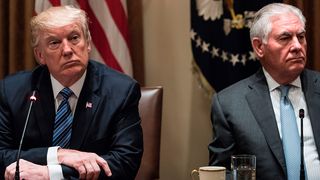A flurry of opinion pieces and analyses marking the first anniversary of the Trump presidency will be penned and published over the next couple of days. The past year has brought about a vibrant cottage industry dedicated to commemorating various milestones of the incumbent US administration: the first 100 days, first six months, first foreign trip, first meeting with a given foreign leader, first speech to the United Nations and a number of other events and occasions, big and small. This body of work often resembles a collective exercise in wishful thinking as commentators attempt to produce evidence of the US president finally starting to act more ‘presidential’ and his foreign policy beginning to fit the mould of orthodoxy.
However, with the passage of these various ‘firsts’, it is becoming increasingly clear that President Trump’s foreign policy is no more coherent and no less unconventional than what was first thought would be the case. Certainly, there have been a number of worst-case scenarios that have not materialised, and there are a few areas in which there has been a continuation of his predecessor’s policy (for better or for worse). Yet, by now, there are certain tenets and tendencies in the conduct of foreign policy under the present administration that stand out as elements of what we might refer to as the Trump doctrine.
It is becoming increasingly clear that President Trump’s foreign policy is no more coherent and no less unconventional than what was first thought would be the case.
Unilateralism and militaristic turn
By abandoning the Paris climate deal, pulling out of the Trans-Pacific Partnership, threatening to walk away from the Joint Comprehensive Plan of Action, cutting contributions to the UN and sending mixed messages on the value of NATO, this administration has signalled it sees little merit in multilateralism, bar occasions when it suits it. The America First slogan translated into governing looks a lot like unilateralism à la Trump, or what has been dubbed “principled realism” to make it sound more academic.
At the same time—and contrary to many early predictions of what the Trump presidency would look like—the unilateral turn should not be equated with isolationism. The past twelve months demonstrate there has been a wilful pivot from the multilateralism of the Obama years, but not to the point that the United States has scaled back its global reach. Under President Trump, the internationalism is redefined in militaristic terms, as evidenced in the 2018 budget request that would increase defence spending and cut funding for diplomacy and development aid.
Tear up (most of) the old diplomacy handbooks and bring on Twiplomacy
This brings us to a related point about the demoted status traditional diplomacy has had over the past year. With a secretary of state who is willingly cooperating in having his organisation’s human and material resources cut, an extremely slow process of nominating and appointing staff to vital positions and overwhelmingly low morale and resignations of career diplomats, the Department of State has been pushed to the sidelines. To be fair, the process of White House-centric foreign policymaking is far from a recent trend; yet, under the current administration it appears the diplomatic tools are considered secondary.
Apart from President Trump’s allergy to the Washington bureaucracy, which he defines as all the executive branch departments except for the Department of Defense, perhaps the key reason as to why he has been ambivalent about the role of the State Department lies in his reliance on Twitter diplomacy. Foreign leaders and governments seem to pay more attention to the president’s social media feed than the State Department’s press briefings. Equally, there are ample examples of when the president openly countered the secretary of state, further undermining belief that Rex Tillerson indeed speaks for the president.
Those countries who want to extract economic and security benefits from the president have reached for pompous ceremonies, military parades and personal flattery. This strategy has been universally successful.
Paradoxically, even though President Trump’s Twiplomacy seems to be upending the rules and practices of traditional diplomacy, there has also been an inescapable impression that the manner in which some foreign leaders have been approaching him is very old school. Those who want to extract economic and security benefits from the president have reached for pompous ceremonies, military parades and personal flattery. This strategy has been universally successful: from France and Saudi Arabia to China.
Protectionism and zero-sum thinking
Another consistency in President Trump’s approach to the world has been his insistence on tying all issues to an economic scorecard and the belief that the international system operates solely on the principle of relative gains where one state’s win is another state’s loss. As such, talk of free trade is antithetical to his credo and security relationships are inevitably examined through the prism of current account surpluses and deficits. The most telling episode of such thinking was the president’s mooting to re-negotiate the US-South Korea free trade agreement in the middle of the nuclear tests conducted by North Korea.
Yet this is an area in which international security considerations and the ‘globalists’ in the administration have so far been relatively successful in controlling the president’s protectionist impulses following withdrawal from the TPP. Despite threatening to escalate trade war with China and pull out of NAFTA, both have been avoided for now although uncertainty remains and, according to some, it is not unimaginable in the short to medium term.
Vale American soft power
Finally, within the ideational sphere and the realm of soft power, President Trump’s greatest impact has been in damaging US authority in promoting liberal democratic values around the world. Granted, even during President Obama’s tenure, the United States was no stranger to criticism about its need for self-reflection on civil rights and individual liberties. However, what has been markedly different over the past 12 months is the drastic lowering of the bar with respect to the basic values that have been enshrined in America’s founding documents.
As the Trump presidency enters its second year, we should all remember there has been scarce change in the president’s core set of beliefs and conduct in office.
President Trump’s repeated and woeful racist remarks, immigration policy reforms and proposals that are skewed against particular religious and ethnic minorities and his attacks on the press, judiciary, legislators and a whole host of other individuals, groups and organisations have the effect of disqualifying this administration from lecturing others on the importance of respecting fundamental individual rights and liberties. The recently published National Security Strategy spells out the ways in which the United States under President Trump’s leadership is committed to championing American values. Yet, it is hard not to contrast it to the president’s statements and Twitter feed, where there has been plenty of daylight between what is being preached and what is indeed being practised.
Ultimately, through constant undermining of liberal democratic institutions and norms, the current occupant of the White House has been implicitly giving a nod to other world leaders who have authoritarian proclivities about the norms and behaviour he finds acceptable. More worrying, he has explicitly endorsed leaders who subscribe to illiberal and even radical ideologies.
As the Trump presidency enters its second year, we should all remember there has been scarce change in the president’s core set of beliefs and conduct in office. Perhaps this might save a lot of ink from being spilt when other milestones come about, including the upcoming delivery of his first State of the Union address later this month. The agenda for scholars and commentators of the presidency should be to focus more carefully on measuring and analysing the myriad of ways President Trump has impacted US standing and relations with the rest of the world.






